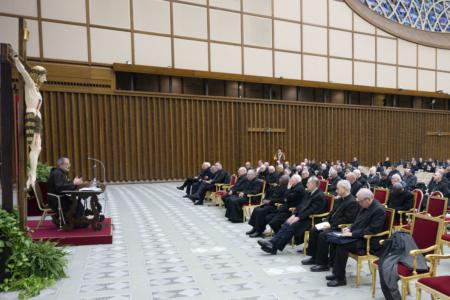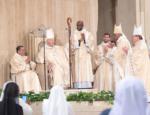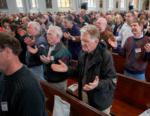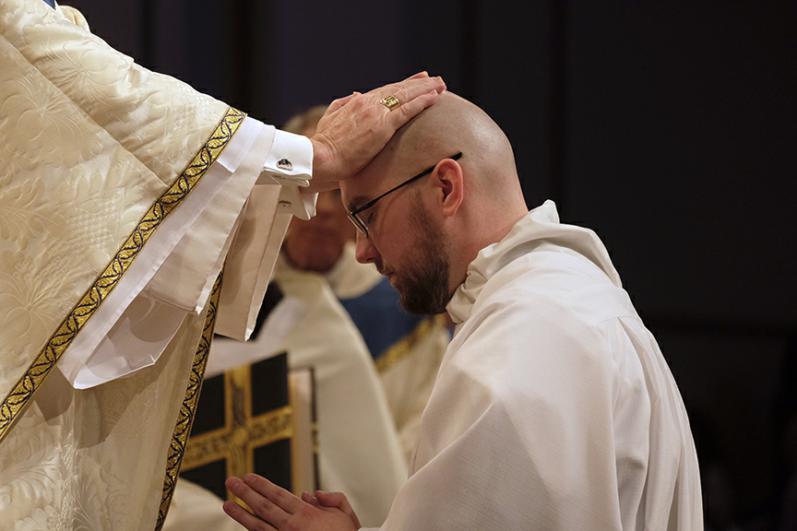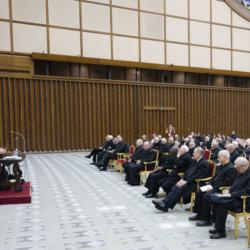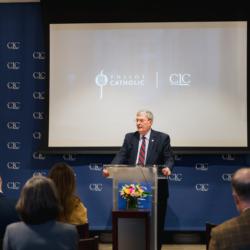A time for silence
Have you ever been somewhere when there was a silence -- expected, planned, or not -- and you were uncomfortable? Perhaps you were thinking: "Did someone miss a cue?" "Where's the musician?" "Who's supposed to be next up?" or "What's going on, or not?"
Silence does not seem to be "normal." Even stranger for us Roman Catholics is that silence is called for frequently throughout our liturgies. Recently, an article on this subject of silence in the liturgy noted that in the Mass alone there are some 22 references to silence. These can be brief, moderate, or longer. If we move into other liturgical celebrations, we see additional references to silence, again of various lengths or intensity. Most of these are not "optional" but rather are expected. Full disclosure, while I am aware of the expectations, I am as uncomfortable in the face of silence as most Catholics are. Some might tell you I am not even aware it exists!
Just a few examples of where at Mass some kind of silence is indicated and expected.
-- At the Act of Penitence: we pause to call to mind our sins so that we can seek the Lord's mercy and celebrate the Mass together properly.
-- At the invitation, "Let us pray," there is a silence so that all of us can take a breath and bring our prayers to mind as the priest gathers them for us in the "Collect."
-- After each of the four Scripture texts proclaimed on Sunday -- first reading, psalm, second reading, and Gospel -- some silence is really needed to absorb the beauty and depth of each reading into mind and heart. The period after the Gospel and prior to the homily should be longer than those following the other readings.
-- During the Liturgy of the Eucharist, there are multiple invitations where the presiding priest (priest in this case means both bishops and priests) is to "lead the silence." During the Preparation of Gifts, an optional silence (if there is no music, as is often so on weekdays); during the various Eucharistic prayers there is a pause of silence for the assembly to enter into prayer. A good example of this is when there is an invitation to call to mind our deceased. We bring our deceased loved ones to mind and prayer.
-- While the procession for the reception of Holy Communion is customarily accompanied by chant or singing, there is a call for a longer silence following the procession. It is parallel to the silence following the homily. Silence gives us a chance to grasp the mystery of the Eucharist we have celebrated together and that we have received, and to prepare to take the Lord's presence beyond the walls of the church.
In other liturgical and sacramental celebrations, there are times of silence indicated. Since all the ritual books have some kind of "liturgy of the Word" (some more abbreviated because of circumstances, e.g. an emergency call for the anointing of the sick) it is not surprising to see an invitation to silence.
One of the most interesting places where silence is expected is during the ordination of a bishop, priest, or deacon. During the Imposition of Hands (in all three cases), we read that the ordaining bishop imposes hands "in silence" on those being ordained. The imposition continues when all the bishops present impose hands on those being ordained bishop; the priests concelebrating the ordination Mass (but not any other bishops present) impose hands on those being ordained priests; and the bishop alone imposes hands on the deacon candidates. In spite of the direction, because of the length of the imposition of hands -- it can vary from maybe five to 20 minutes -- liturgical musicians cannot seem to bear the silence and inevitably start either choral, assembly, or instrumental music. Likewise, when the explanatory rites follow, these are to be celebrated so that the assembly may both hear and see the sacred action. In this case, the assembly participates by its silent attention.
Our society likes to be busy; we are just accustomed to constant noise of all kinds and decibels (for some the higher the better.) Yet in some way, earbuds and headphones indicate a desire to tune out all that noise, while limiting it to "my noise."
All of us who are responsible for the preparation and celebration of any liturgy perhaps could slow it down just a bit with attention to the silences requested of all of us. God speaks to us in the sacred liturgy. Sometimes, God needs our silence so you and I can hear and receive the Word he speaks; receive his son in his Real Presence; and experience the Holy Spirit's many gifts.
